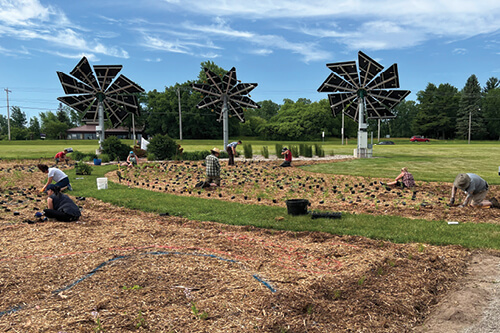A growing focus on sustainability

To combat climate change, NWTC has spent the last two years tracking resource usage and focusing on projects to increase sustainability. The pillars of this effort include benchmarking and reducing energy, carbon, and waste, shifting towards sourcing more sustainable food in the cafeteria, and stewarding the College’s land.
As a member of the Wisconsin Governor’s Task Force on Climate Change, NWTC President Dr. Jeffrey Rafn has been working to understand and create climate strategy at a state level since 2019. During the start of the pandemic, he created the Environmental Climate Stewardship (ECS) Committee to bring together passionate individuals and experts from across the College to infuse sustainability into institutional practices.
“As I get older, I often think about the world I will leave my grandchildren,” said Dr. Rafn. “I want to ensure that we do our best to leave them something they can enjoy, and that starts by creating positive change at NWTC and in our community.”
Over the last two years, the ECS Committee has implemented College-wide strategies to reduce waste and carbon generation, increase the use of sustainable food, and create natural spaces on campus.
Some of the major milestones of these efforts include decreasing carbon generation (down 51% from 2005 levels!), receiving Tree Campus USA designation, offering sustainably sourced food in the cafeteria, and creating a half-acre pollinator habitat on the front lawn of the Green Bay campus.
Home to nearly 12,000 native plants, the pollinator habitat is a unique green space for the community that serves as a refuge for insects and a living learning lab for NWTC agriculture and environmental students. The massive undertaking was made possible through a partnership with Green Bay Botanical Garden and Stone Silo Prairie Gardens.